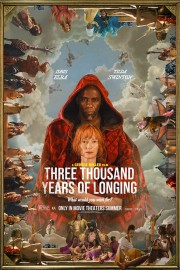Three Thousand Years of Longing
The one thing you can say about George Miller is that he’s unpredictable as a filmmaker. Yes, the “Mad Max” franchise is indisputably what he’s known for, but when you have “Lorenzo’s Oil,” “The Witches of Eastwick,” “Babe: Pig in the City” and “Happy Feet” also on your resume, no one can accuse you of being stale. For his first film since “Mad Max: Fury Road,” Miller tells a story centered around two people in a hotel room, consumed by a story of how they came together. It’s a film I’m still processing, but in doing so, I’m finding I appreciate more of it than I don’t.
Alithea (Tilda Swinton) is a scholar who is in Istanbul giving a lecture on myths, science, and how they co-exist now. She has a vision of a large, hulking individual during the lecture, and she faints. Afterwards, her colleague is walking with her, and in a shop, she finds an antique bottle that sounds like it has a story, but could be a replica. She buys it, and takes it back to her room. As she’s cleaning it, the lid breaks open, and out comes a Djinn (Idris Elba). She has three wishes, but there are rules. That’s when we learn his story.
Right away, “Three Thousand Years of Longing” announces its intentions as a film about storytelling and fairy tales and fantasy. The film is bookended by narration by Alithea, who reveals immediately that, the best way for her to tell this story, is as a fairy tale. I like that approach, because it allows us to frame the film, written by Miller and Augusta Gore from the short story by A.S. Byatt, in a proper context, and gives Miller an opportunity to challenge our ideas of whether all of this is really happening in the film’s reality, or just a work of fiction Alithea has come up with to frame her own awakening to life’s possibilities. Normally, we might consider Alithea an “Unreliable Narrator,” but isn’t much of fantasy and genre storytelling done to give us an imaginative notion of grounded ideas and stories? Immediately after watching the film, I wonder if that’s something I grasped on to and appreciated about Miller’s film; now, it’s one of the things that makes the film feel special.
The Djinn has three stories to tell to Alithea- all related to his journey of how he came into her possession, but they also set the rules and cautionary notions of having the power to make wishes, to make your world what you want. All the while, we see Djinn as someone who embraces life, but is also trapped by his station, a duality that Elba conveys quite well. We see him waiting, and longing, but also being intrigued by humanity and its possibilities, both good and bad. The storytelling by Miller is a bit rough, at times- because there are at least two extended vignettes within the film (as he tells the Djinn’s stories), the pacing is not as precise and confident as it was in “Fury Road,” but I would argue that the story of Djinn and a young wife (Burcu Gölgedar), alone in a tower with her curiosity of the world, is as profound a piece of filmmaking as anything we’ve gotten this year. There are beautiful moments throughout “Longing” (the film has great production values, and a lovely score by Tom Holkenborg), but there are also times where it feels like Miller cannot wrap his head around the best way for this film to unfold to maintain momentum. Sometimes, one just has to plow through, and get to his points along the way. As a result, some pieces of this film may not connect with you, but a lot of them did with me, including an ending that feels natural to the final puzzle of the film. This isn’t about happily ever after, but a life changed, which will be better after having the experience it has had. For the Djinn, that’s all it’s ever really wanted.










